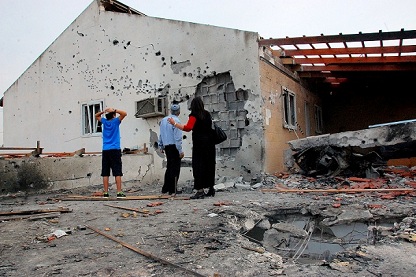Fulfilling the Ceasefire Understandings
· Eight days after it began, Operation Pillar of Defense ended when understandings were reached regarding a cessation of hostilities as of 2100 hours, November 21, 2012. Until 2300 hours sporadic rocket fire continued into Israeli territory (an estimated ten hits). As of November 27, since 2300 hours, November 21, the ceasefire has been maintained almost in toto.
Photo: Zohar family from Netivut, staring at their damaged home after it was hit by an Iranian Grad missile fired from Gaza, Tal Zohar, 11 years old in the photo was home alone at the time of the expolsoin, 18/11/12, Noam Bedein, Sderot Media Center
IDF Strikes – Data from the IDF Spokesm
According to the IDF Spokesman, the IDF achieved its objectives and struck a severe blow to Hamas and its military-terrorist capabilities. Its infrastructure was seriously damagedby the IDF, including its chain of command and control; its terrorist capabilities, facilities, bases and senior commanders. Its strategic capabilities were struck by the IDF, among them its long-range rockets (capable of hitting targets at a distance of 40 kilometers, or 25 miles) and hundreds of rocket launchers and medium- and short-range rockets. Thusthe IDF significantly disruptedHamas’ rocket-launching capabilities. In addition, the Iron Dome aerial defense system was highly successful, and only 7% of the rockets launched into Israeli territory fell in populated areas. Israel’s military achievements led to the conditions for the ceasefire understandings (IDF Spokesman, November 22, 2012).
A total of 1,500 terrorist targets throughout the Gaza Strip were attackedin Operation Pillar of Defense (IDF Spokesman, November 22, 2012).
· 30 senior Hamas and Palestinian Islamic Jihad operatives
· 19 command centers
· 980 underground rocket launchers
· 140 tunnels used to smuggle weapons
· 66 tunnels used for terrorist activities
· 42 Hamas situation rooms and bases
· 26 weapons workshops
· Dozens of long-range rocket launchers and launching sites












